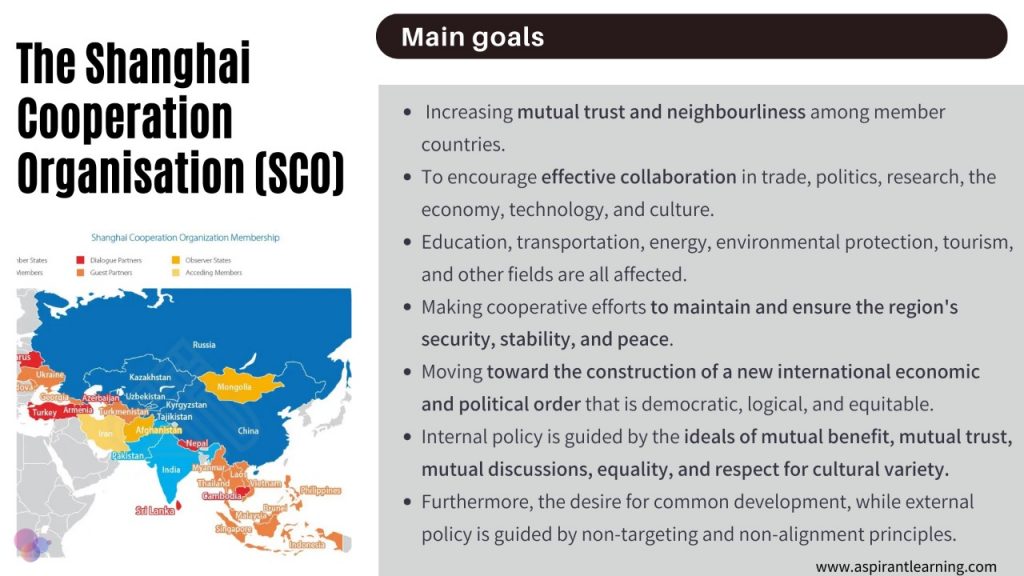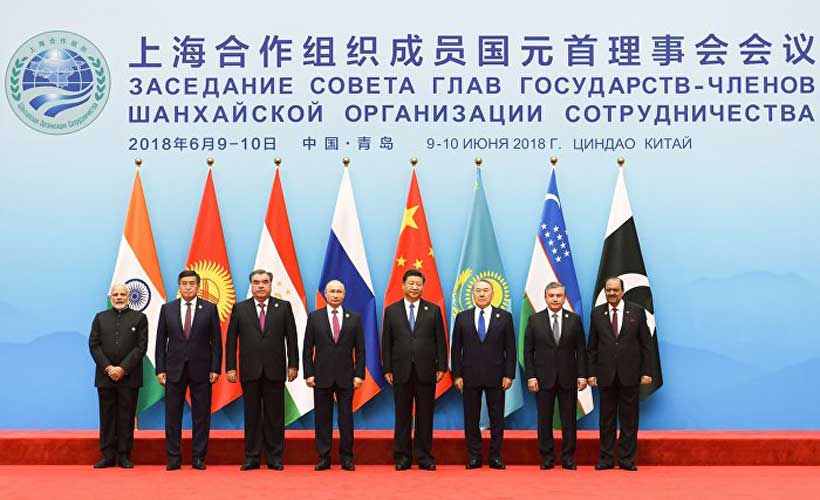News Highlight
Pakistan’s Prime Minister and China’s newly appointed Foreign Minister will be invited to the SCO summit.
Key Takeaway
- India has taken over as Chairperson of the SCO for 2023 and will host leaders of all SCO countries at a summit in Delhi expected in mid-2023.
- India has invited Pakistan Foreign Minister Bilawal Bhutto, among other members, to attend the Shanghai Cooperation Organisation (SCO) Minister’s meeting.
- Officials confirmed that it would be held tentatively in Goa in early May this year.
Shanghai Cooperation Organisation (SCO)
- About
- firstly, it is a permanent international intergovernmental organisation.
- It was established in 2001.
- In addition, the SCO Charter was signed in 2002 and took effect in 2003.
- It is a political, economic, and military organisation in Eurasian that seeks to ensure regional peace, security, and stability.
- Furthermore, it checks the North Atlantic Treaty Organization (NATO).
- It is a nine-member economic and security bloc that has become one of the most influential transregional international organisations.
- Official Languages
- Russian and Chinese
- Members countries of SCO
- China
- India
- Kazakhstan
- Kyrgyzstan
- Russia
- Pakistan
- Tajikistan
- Uzbekistan
- Iran
Structure and Working of SCO
- The SCO’s top decision-making body is the Heads of State Council (HSC).
- The HSC meets annually and establishes guidelines and decisions on all SCO-related issues.
- The SCO Heads of Government Council (HGC) meets once a year to discuss the organisation’s multilateral cooperation strategy and priority areas.
- Its purpose is to resolve current critical economic and other cooperation concerns.
- The organisation has two permanent bodies:
- Executive Committee of the Regional Anti-Terrorist Structure (RATS) based in Tashkent.
- In addition, SCO Secretariat is based in Beijing.
- The Council of Heads of State appoints the Director of the Executive Committee of the SCO RATS and the SCO Secretary-General for a three-year term.
Significance of SCO for India
- The event’s theme is “For a SECURE SCO”.
- SCO is Part of India’s goal of pursuing “multi-alignments”.
- The strategic and geographical space that the SCO occupies is critical from an Indian standpoint.
- Security, strategic, economic, and geopolitical concerns are all inextricably linked to advances in this region.
- Additionally, Terrorism, radicalism, and instability seriously threaten Indian sovereignty and integrity.
- India requested intelligence and information from the SCO’s counter-terrorism organisation, the Regional Anti-Terror Structure in Tashkent (RATS).
- Subsequently, a stable Afghanistan is in India’s interests, and RATS gives access to counter-terrorism information that is not centred on Pakistan.
- With Central Asia’s landlocked states and Uzbekistan doubly landlocked, access to these resources becomes problematic.
- India has prioritised the development of the International North-South Transport Corridor in this regard.
- By joining the SCO, India can link with other South Asian countries.
- Furthermore, the Central Asian region is abundant in essential minerals and natural resources.
- The main focus is on energy cooperation.
- However, India will have to contend with an assertive China that will push its Belt and Road Initiative.
- The SCO membership will assist India in becoming a significant pan-Asian player, which is currently restricted to the South Asian Region.
Challenges of SCO Membership for India
- Firstly, India may face difficulties due to Pakistan’s admission to the SCO.
- In addition, India’s ability to exert itself would be constrained.
- As a result, it may be forced to play a subordinate role because China and Russia are co-founders of the SCO and its central powers.
- India may also be forced to diminish its expanding alliance with the West or perform a delicate balancing act, as the SCO generally has an anti-Western stance.

Conclusion
- India’s extended neighbourhood includes Central Asia.
- India’s connections with the region offer significant potential for strengthening ties in economic, security, policy, investment, commerce, connectivity, energy, and capacity building.
- India’s SCO membership will allow the country’s leaders, including prime ministers, to meet with counterparts from Central Asia, Russia, China, Afghanistan, and other countries regularly and frequently.
- Furthermore, its participation of India in the Eurasian Economic Union (EEU) will be an added benefit to this alliance.
Pic Courtesy: Modern Diplomacy
Content Source: The Hindu



